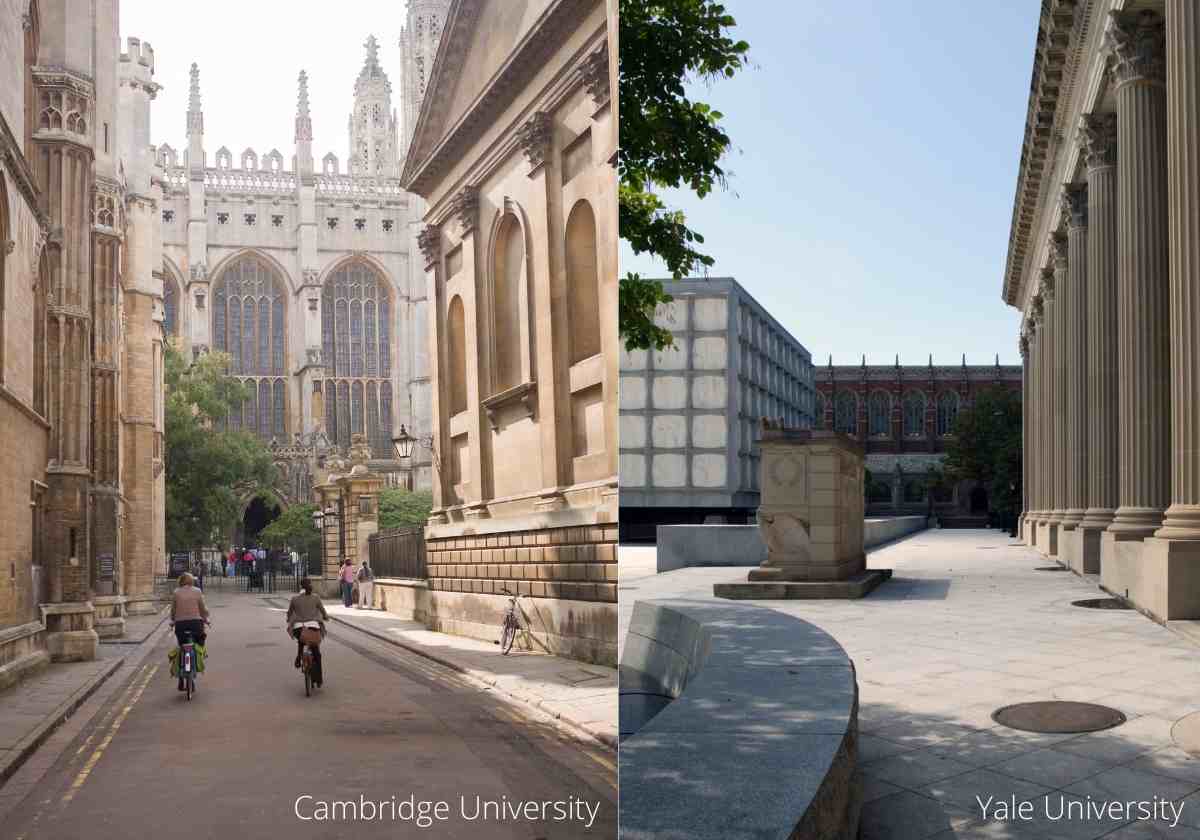Oxbridge Vs the Ivy League
For some university applicants, the choice won’t just be between joining Oxford or Cambridge, but Oxbridge or the Ivy League. It’s a difficult decision – there’s an awful lot more separating them than just 4,000 miles of the Atlantic Ocean. Course structure, student population, and academia all need to be weighed up and considered. Of course, there’s no wrong answer when it comes to elite universities, but some will be a better fit than others.
In terms of raw academic performance, Oxbridge is a much more consistent performer. Oxford secured the crown in the most recent Times Higher Education rankings, and Cambridge took fifth. Whilst Harvard secured a respectable silver medal, the only other Ivy League-ers in the top 10 were Princeton and Yale. Beyond them, performance was erratic, from Columbia (11) just falling short of the crème de la crème, to Dartmouth (99) squeezing into the top 100. Yet places are more sought after in the US institutions, with the pandemic pushing acceptance rates down to historic lows. While Oxbridge takes around 20 per cent of applicants, Dartmouth – on the outer ring of the Ivy League – took just 6.2 per cent this year. Harvard is almost half of that.
The US universities also vary massively in terms of their student population. Dartmouth, Brown, and Princeton accept well under 10,000 each, whereas Harvard, Columbia and Penn take an Oxbridge-sized cohort of around 20,000. On the other hand, the English universities can feel more intimate than you’d expect because they’re divided into colleges. If you end up at a small one – like Corpus Christi in Oxford or Cambridge’s Peterhouse – then you might have a fairly cloistered existence in a small community.
In fact, the personal experience is something Oxbridge does extremely well. Ivy League universities are structured around seminars, lectures, and the like, but across the Atlantic there’s a focus on tutorials (even scientists have weekly or twice weekly tutorials, despite spending most of the working week in the lab). Tutorials are possibly Oxbridge’s greatest selling point and certainly a key factor in their academic and reputational dominance. In personal meetings with a tutor, you can discuss your work, explore ideas with an intellectual latitude, and put questions to and be questioned by one of the experts in your field (if not the expert). Some tutors might even offer you a drink – a sherry is not unfamiliar to some of the older dons – and it’s a distinctive academic experience that you won’t get anywhere else. I found the tutorial system turned me into quite a salesperson. If I can convince one of the most renowned Philosophy dons in the world that I know what I’m talking about, I can sell anything. These soft skills gained from the tutorial system are often overlooked, but be open to their ability to help you land your dream job in a few years’ time.
The Ivy League can’t muster this deep dive into a subject, but it does have the great merit of breadth. Rather than picking one subject during their application, students “major” in one subject – making up the bulk of their degree – which they generally don’t have to pick until the end of their second year. They also pick a “minor”, potentially unrelated, subject. Of the Oxbridge universities, Cambridge comes the closest to offering something similar, where undergraduates have more scope to specialise in modules after their first year. But there’s no real counterpart to the US system.
One other factor is cost. If you’re a UK resident, able to get home status, a year at Oxbridge will cost £9000 in fees and another £10,000 at the absolute most for living expenses. You should be able to qualify for a student loan to help with this. If you’re travelling to the US, without a scholarship, you’re looking at fees of over $50,000 (over £40,000 as of 18th May 2022). You then need to live and get there, and that could easily cost another £10,000 a year. Ivy League, for a UK student, is considerably more than double the cost with no UK government student loans available. There is, however, plenty of financial support from Ivy League universities available. Ivy League universities do not, however, offer academic or sports scholarships; they are all based on financial need.
So, Ivy League or Oxbridge? It depends what you’re looking for and what you can afford. Oxbridge opts for depth whereas the Ivy League goes for breadth. In England, you can get an in-depth look at a subject (or at two or three, if you’ve chosen joint honours), and strike up a more personal relationship within a college and with your tutors. If mixing and matching is more your style, then consider the Ivy League, and take your pick from the varied assortment of universities. Would the intimacy of a collegiate system work for you? If so, Oxbridge is best. Above all, it’s a good idea to visit the place where you might end up spending (at least) three years of your life.

